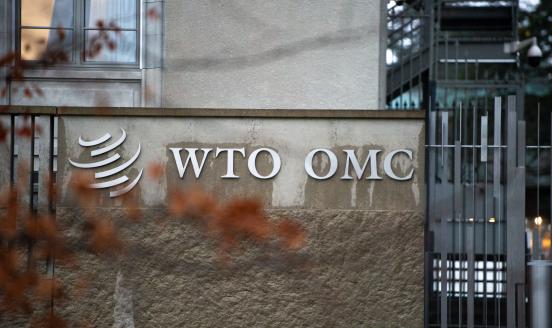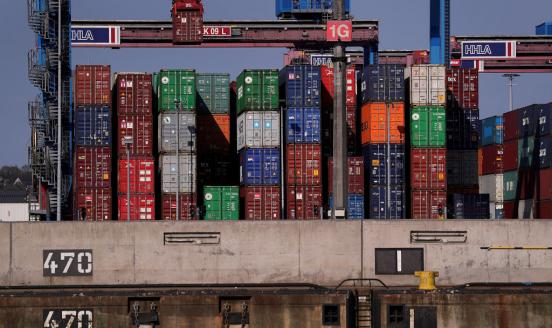The border adjustment tax: a dangerous proposal
Reflecting the fact that the United States imports more than it exports, border adjustment tax is considered by its proponents as an essential part of
The border adjustment tax (BAT) is a proposal first put forward in June of last year by Republicans in the United States House of Representatives as part of a far-reaching tax reform. Republicans are now in a much stronger position to implement their tax reform agenda than they were then, and there is a considerable likelihood that the BAT will be enacted in some form as part of a new tax code.
The precise provisions of BAT are being debated, but they are widely understood to entail changing the way corporate income tax is calculated in the following way: for the purpose of calculating a company’s income tax, the cost of imported inputs will no longer be deducted from a company’s revenue; and the revenue accrued from exports will no longer be included in a company’s total revenue. This means, for example, that Wal-Mart, a large net importer, will pay a lot more tax than under the current system while Boeing, a large net exporter, would pay a lot less tax. American consumers shopping at Wal-Mart would face higher prices to offset the retailing giant’s increased tax bill and Wal Mart would have a strong incentive to buy Yogurt made in Wyoming rather than Yogurt made in Greece. Boeing, in contrast, could reduce the price of its aircraft to reflect its smaller tax bill, encouraging foreigners to buy from Boeing instead of from Airbus. The burden of the tax will fall in very large part on consumers.
The BAT may appear arcane to many readers, but it is an important proposal supported by large firms such as General Electric, well-known economists such as Alan Auerbach, Douglas Holtz-Eakin, and Martin Feldstein and by House Speaker Paul Ryan. Reflecting the fact that the United States imports more than it exports, it is expected to raise about 1 trillion $ over ten years and is considered by its proponents as an essential part of the tax reform package. The revenue from BAT is needed not only to offset other tax cuts but also to fund Mr. Trump’s ambitious infrastructure investment plans. It is being sold to the new Trump administration as a way to reduce the resort to tax havens abroad and to discourage offshoring, without raising tariffs. Peter Navarro, the Director of the new National Trade Council, and the author of a 2010 book “Death by China”, appears inclined to endorse the BAT, and there are reports that the President, who initially found it too complicated, is warming to it.
I am not a lawyer, but it seems inevitable to me that the BAT – if it turns out to include the provisions described above - would be challenged and found to be in violation of the WTO. It would be clearly at odds with the WTO’s National Treatment principle, since imports, having crossed the US border and paid the tariff, would be discriminated against by means of the corporate income tax. If the rate on corporate income tax is set at 20%, then by not counting imports as part of the cost base for income tax purposes the United States is in effect levying the equivalent of a 20%. tariff. Additionally, by not counting export revenue as part of a company’s total revenue, the United States would effectively provide a subsidy of 20% on exports. There are ways to modify the BAT to make it less distortive of trade and so make it more WTO-compatible, but, short of turning it into a VAT, it is difficult to do so without creating complexity or without reducing its revenue-raising capacity (Hufbauer and Lu, 2017).
In the minds of its proponents, the BAT levels the playing field with countries that have adopted VAT (about 160 countries apply VAT, while the United States applies a Sales Tax which varies by state). VAT is viewed by them as discriminatory because it applies to imports but exempts exports. But this view is mistaken and reflects a failure to understand how VAT works. The VAT is a tax on consumption and its incentive effect is identical to a sales tax. VAT does not discriminate against imports, since the consumer pays the same VAT on imported products and those produced at home. And the VAT does not discriminate in favor of exports since under the VAT system, producers act merely as tax collectors. Producers are neutral on whether they sell at home or abroad. When they sell at home, they turn the proceeds of the VAT over to the government, minus the VAT they paid on their supplies, leaving them whole. When they sell abroad, there is no VAT charged to their customers but, provided they can show proof that the merchandise has been exported, they can reclaim the VAT they paid on their supplies, again leaving them whole.
It is true that a Belgian consumer buying a US product pays a much higher VAT than a US consumer pays in Sales Tax, but that is a choice entirely in the hands of the US authorities. They could raise the Sales Tax or introduce a VAT at levels similar to Belgium, raise the additional tax revenue they seek, and remain entirely WTO consistent.
Proponents of the BAT argue that it will raise revenue but it will not affect international trade because the US Dollar will appreciate to offset the effects of the tax on US trade flows. According to this view, the value of the US dollar is driven by the current account balance of the United States and if, as expected, the initial effect of the BAT will be to cause that balance to improve, the dollar will appreciate to offset its effects. But at any point in time, exchange rates respond to monetary policy, growth prospects, and asset preferences, as much as they do to the current account balance. Variations of the US dollar are only very imperfectly and variably associated with changes in the US current account balance. Further, current account balances respond to changes in domestic demand more than to changes in tax and tariff policies. For example, over the last two years the US Dollar appreciated some 15% in trade-weighted terms, yet neither US tax policy nor US tariff policies changed. Thus, there is no reason to presume that currency movement will exactly offset the effects of the BAT.
But the more important objection to the notion that currency shifts will offset the BAT relates to the ability of the WTO to discipline trade and tax policy. If the principle of a BAT as currently configured became accepted, then any tax measure discriminating uniformly against imports and any uniform subsidy of exports could be justified on grounds that the currency will adjust. The United States is the world's largest economy and the architect of the WTO. The introduction of BAT – if configured as currently understood – is not only likely to be challenged in the WTO but if the United States persists with it, could sooner or later undermine the system.
There is considerable political momentum behind the BAT proposal at present: although importers hate it, the BAT generates badly needed tax revenue, many businesses like the idea of a lower corporate tax rate packaged together with the BAT, exporters love the BAT, and the tax responds to the protectionist sentiments of the administration. It is important that the United States’ largest trading partners help break this momentum. They must make their views clear on the BAT early on. They should leave no doubt that they intend to challenge the BAT at the WTO. Moreover, since WTO disputes take many years to settle, they should leave open the possibility of deploying counter-vailing duties which can be applied rapidly.
I expand on the ideas in the blog in my paper Will America Trigger a Global Trade War?, written for OCP Policy Center.
References
Hufbauer, Gary in Assessing Trade Agendas in the Presidential Campaign, PIIE, September 2016
Hufbauer, Gary and Lu, Zhiyao “Border Tax Adjustments: Assessing Risks and Rewards” PIIE, January 2017
“A Better Way” (Ryan’s tax plan”) June 2016
https://abetterway.speaker.gov/_assets/pdf/ABetterWay-Tax-PolicyPaper.pdf



